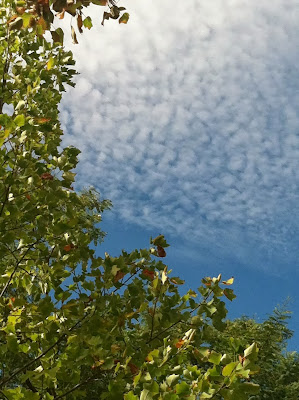Think about those moments in the second movement, Hawthorne, when glimpses of serene, childlike melodies emerge momentarily from a phantasmagorical kaleidoscope of music, only to be crushed by yet another avalanche of sound. The sweet lullaby of a Polish Christmas Carol, Lulajze Jezuniu (Hush, baby Jesus), emerges, to the same effect, in Chopin's Scherzo No. 1 (hear Garrick Ohlsson's interpretation), creating a moment of respite, among wildly careening sound masses that ultimately destroy the homely sweetness with their despairing might. You may also listen to a jazzy arrangement of this fragment of Chopin's Scherzo by Polish vocal quartet Novi Singers.
It is easy to fall into "purple prose" when trying to capture the effect of music on the mind and heart after a spectacularly inspiring concert, such as the rendition of Charles's Ives transcendental Concord Sonata by the California pianist, Susan Svrcek. The concert, on September 20, 2013 was presented in a collaboration of Piano Spheres and Boston Court, a musical organization and a theatrical institution. The result was sublime, thanks to a great pianist taking her audience on a travel through a sonic landscape envisioned by an absolute, complete genius. "It's getting better all the time, doesn't it..." commented Catherine Uniack, the Executive Director of Piano Spheres, on her way out the door. Yes, such a glorious evening inspires one to even quote the Beatles.
Let's start from Ives's words, though, from his "Essays before a Sonata" that encapsulated his frustration with "the instrument! ... there is the perennial difficulty-there is music's limitation... Is it teh composer's fault that man has only ten fingers?" And his tongue-in-cheek expression of musical aesthetics: "We like the beautiful and don't like the ugly; therefore, what we like is beautiful, and what we don't like is ugly - and hence we are glad the beautiful is not ugly, for if it were, we would like something we don't like."
Now, that sounds like sophistry, or splitting the match-head into four, but is it? Susan Svrcek selected this quote for the program notes of her recital, coupling it with other quotes from Ives's Essays that explain his understanding of the spiritual essence of the four Transcendentalists portrayed in the four movements of the sonata, one of the greatest works of the century - composed by Ives (1874-1954), who made his living as an insurance salesman and invested his time in music.
- Ives on Ralph Waldo Emerson: "Though a great poet and prophet, is is greater, possibly as an invader of the unknown, freely describing the inevitable struggle in the sol's uprise and would then discover, if he can, that 'wondrous chain which links the heavens with earth - the world of beings subject to one law."
- Ives on Beethoven's Fifth: "There is an 'oracle' at the beginning of the Fifth Symphony - in those four notes likes one of Beethoven's greatest messages. We would place its translation above teh relentlessness of fate knocking at the door, above the greater human-message of destiny, and strive to bring it towards to spiritual message of Emerson's revelations - even to the 'common heart' of Concord - the Soul of humanity knowing at the door of the Divine mysteries, radiant in the faith that it will be opened - and that the human will become the Divine!"
- Ives on his music for Nathaniel Hawthorne "which is but an extended fragment trying to suggest some of his wilder, fantastical adventures into the half-childlike, half-fairy like phantasmal realms. It may have something to do with the children's excitement on that 'frosty Berkshire morning," and the frost imagery on the enchanted hall window, or something to do with the old hymn tune that haunts the church and sings only to those in the churchyard, to protect them from secular noises, as when the circus parade comes down Main Street; or - not something that happens but the way something happens; or something about the ghost of a man who never lived, or about something that never will happen, or something else that is not."
- Ives on the Alcotts's house in Concord (home of Bronson Alcott and Louisa May Alcott: "Within the house, on every side, lie remembrances of what imagination can do for the better amusement of fortunate children who have to do form themselves - much needed lessons in these days of automatic, ready-made easy entertainment which deaden rather than stimulate the creative faculty. And there sits the little old spinet-piano Sophia Thoreau gave to the Alcott children, on which Beth played the old Scotch airs, and played at the Fifth Symphony."
- Ives on Henry David Thoreau: "As he stands on the side of the pleasant hill of pines and hickories in front of his cabin, he is still disturbed by a restlessness. His eagerness throws him into the lithe, springy stride of the specie hunter - the naturalist - he is still aware of a restlessness with these faster steps his rhythm is of a shorter span - it is still not the tempo of Nature, and h e knows now that he must let Nature flow through him and slowly; he releases his more personal desires to her broader rhythm. And before ending hid say he looks out over the clear, crystalline water of the pond and catches a glimpse of the shadow-thought that was in the morning's mist and haze - he knows that by his final submission, he possesses the 'Freedom of the Night,' with a strange liberty in Nature, a part of herself."
At the beginning of her performance, the pianist pointed to these quotes she selected to insert in the program. She then explained her general interpretation of the four parts of the Sonata. As Svrcek stated, other musicians sometimes experiment with changing the order of the movements, to end on a note of grandeur instead of tranquility, but she firmly believes that the order selected by Ives is perfect, it is what it should be. We start in the transcendence of the universe, finding our place in the cosmic order and disorder of the world (Emerson). We are then surrounded by the chaos and liveliness of the bustling town or village, where marching bands meet half-way through their different tunes and everyone has something different to say (Hawthorne). Going inward, in the next stage, we find rest and happiness in the safety of our homes (The Alcotts), and then there is just solitude, being alone within the world and hearing the call from beyond one self that can only be heard when one is by oneself (Thoreau). The trajectory from the universe through city crowds to loneliness, from the whole world to one person, from external glories of nature to the tranquility of internal life provides unassailable logic to Ives's Concord Sonata.
Ellenai 1
I drank the sun –
there is nothing left
for the world
I’m full of light
nobody’s sweetheart
I am a universal widow
of forty four springs
and one true love
(prophetic poetry
echoes through my mind
with this messianic number)
life’s winds took me
from place to place
like a rose-petal
carried by waves
I breathe the sky –
torn apart by red clouds
its blue pierced
But there's another trajectory that leads through the stages of human life, as in the famous riddle of the Sphinx: "What goes on four legs in the morning, on two legs at noon, and on three legs in the evening?" Oedipus's answer - "the man" - is at the heart of Ives's spiritual quest. This Sonata portrays a spiritual ascent through turmoil, drama, anger, whimsy, trivial and elevated joys and delights, to a deep and singular understanding. It moves from the surface inwards, on a path towards maturity. The monumental movements of cosmic dimensions glitter with internal light under Svrcek's dancing fingers: alternatively taking your breath away and moving you to tears.
The alternation of moments of phantasmagorical grotesque and the briefest stillness of beauty emerging like brittle islands of peace in the Hawthorne. The reflection of a reflection, or quotation of a quotation - a memory of music, with Ives taking us inside the warm glow of a candle-lit parlor, with the family gathered around the piano to listen to Stephen Foster's songs in The Alcotts. The 'oracle' four-note motive from Beethoven's fifth that takes us to the door of Divine mysteries, a threshold of comprehension of our place in the world...
Amor 6
the more I love
the more dangerous
life becomes
in its graphic beauty
carved with a dagger
stolen from time
the blade cuts
old wounds open
it slides on the skin
of the moment
pierced by knowing
(C) 2006 by Maja Trochimczyk (from Miriam's Iris)
Every time I hear this Sonata I understand something new, something more profound about its beauty. It speaks, with its timeless voice, of wisdom and acceptance of our place in the cosmic order, the place in the world, in our communities, in our homes. The magical appearance of a distant flute in the finale dedicated to Thoreau brings this idea to the forefront (and cannot be easily heard on a recording). Flutist Julie Long was beautifully playing from behind closed doors in a quiet dialogue with the piano in a breath-taking rendition of one of the most sublime, unforgettable moments in the entire history of music. It is a moment wrought with meaning. A voice is heard from beyond time, a melody that in its pure essence is timeless personified. T.S. Eliot tried to capture this voice in his Little Gidding from the Four Quartets:
The voice of the hidden waterfall
And the children in the apple-tree
Not known, because not looked for
But heard, half heard, in the stillness
Between the two waves of the sea.
Quick now, here, now, always--
A condition of complete simplicity
(Costing not less than everything)
And all shall be well and
All manner of things shall be well
When the tongues of flame are in-folded
Into the crowned knot of fire
And the fire and the rose are one.
Ellenai 6
with the noise
of unfurling wings
silence descended
turmoil within
my frightened self
dissolved
into the glass surface
of tranquil seas
at sunset
angels account for
moments such as these
love’s cruel sweetness
my days are numbered
I’m caught again
emptied
of thought and sorrow
poured
into the last vessel
of midnight calm
(c) 2002 by Maja Trochimczyk (from Miriam's Iris)
Ives wrote about Beethoven's famous four note motive that he called the "oracle" of human fate (ta-ta-ta-daa). The motive's presence is vividly felt throughout the Concord Sonata, yet I went home singing not that famous theme, but a humble, if uplifting Hymn that also permeates The Alcotts: Henry Carey's 1844 melody to "God Bless our Native Land" (in the recording you will hear the organ surrounded by birdsong at St. Luke Church of Sedona, Arizona). I then think of
"My Country 'tis of Thee, sweet land of liberty, of Thee I sing..." and go to bed singing American patriotic songs I never knew, growing up in distant Poland.
___________________________________
Charles Ives's Concord Sonata, or, as it formally titled "Piano Sonata No. 2, "Concord, Mass., 1840-1860" was composed between 1911 and 1915, and first published in 1919, with the second revised edition issued in 1947.
For those who missed this concert, and would like to listen to transcendental music on horrible laptop loudspeakers here are some YouTube links:
Gilbert Kalish plays Ives's Concord Sonata (whole piece, 49 minutes)
John Kirkpatrick plays The Alcotts from the Concord Sonata (second movement)
Jeremy Denk plays Ives's Concord Sonata (whole piece)
If you missed the concert and want to hear Susan Svrcek playing for the Piano Spheres again you have to wait until April 22, 2014, when she'll be on the program.
In their 2013-14 season, the Piano Spheres will also present:
Gloria Cheng (November 12),
Mark Robson (February 11, 2014), and
Vicki Ray (March 18, 2014).




















